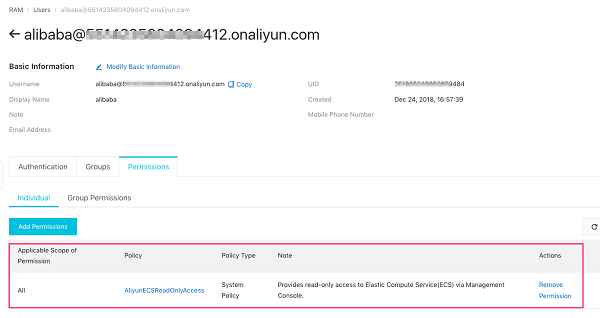By Anish Nath, Alibaba Cloud Tech Share Author. Tech Share is Alibaba Cloud's incentive program to encourage the sharing of technical knowledge and best practices within the cloud community.
If your Alibaba Cloud Elastic Compute Service (ECS) inventory fluctuates over time, with hosts spinning up and shutting down in response to business demands, the static inventory solutions will not serve your needs. You may need to track hosts from multiple sources like CMDB, manual query and compilation and all other tedious tasks.
Ansible integrates all of these options via a dynamic external inventory system using Ansible Alicloud Module inventory scripts which can be found here https://raw.githubusercontent.com/alibaba/ansible-provider/master/contrib/inventory/alicloud.py
In this article we will learn how to:
There are two ways to install Alicloud provider. However, before installing it, you should ensure Ansible has been installed in your server. If not, please install it.
Log in to your Alibaba Cloud ECS controller node or your managed node and install the following components:
$ ssh root@47.254.17.249 root@47.254.17.249's password:
Welcome to Alibaba Cloud Elastic Compute Service !
$ sudo pip install ansible
$ sudo pip install ansible_alicloudNote: Make sure your NTP is in sync, otherwise you will be seeing API call failure
In case you are new to Alibaba Cloud, you can get $10 worth in credit through my referral link to get started on an ECS instance.
You can specify your Alibaba Cloud authentication credentials (access key and secret key) by passing them as environment variables or by storing them in a vars file.
To pass authentication credentials as environment variables:
export ALICLOUD_ACCESS_KEY='XXXXXXXXXXXXX'
export ALICLOUD_SECRET_KEY='YYYYYYYYYYYYYZZZZZZZZZZZZ'The RAM key associated with this account should be having appropriate permission to query Alibaba Cloud resources. The granularity to be determined by the system security professional at minimum it should be having AliyunECSReadOnlyAccess

Download the latest version of the Alibaba cloud dynamic inventory script alicloud.py and make it executable:
$wget https://raw.githubusercontent.com/alibaba/ansible-provider/master/contrib/inventory/alicloud.py
$chmod +x alicloud.py
$sudo cp alicloud.py /etc/ansible/hostsDownload the sample Ansible Alibaba Cloud ECS dynamic inventory, modify it to suit your needs and copy it to /etc/ansible/alicloud.ini:
$ wget https://raw.githubusercontent.com/alibaba/ansible-provider/master/contrib/inventory/alicloud.ini
$vi alicloud.ini
$sudo cp alicloud.ini /etc/ansible/You can test the Alibaba Cloud dynamic inventory script manually to confirm it is working as expected:
$ ./alicloud.py --listAfter a few moments you should see some JSON output with information about your ECS instances.
[Instance:i-rj9djh1xn7tava07qtam]
{
"_meta": {
"hostvars": {
"i_rj9djh1xn7tava07qtam": {
"ansible_ssh_host": "47.254.17.249",
"auto_release_time": "",
"availability_zone": "us-west-1b",
"block_device_mapping": [
{
"attach_time": "2019-01-04T04:43:26Z",
"delete_on_termination": true,
"device_name": "/dev/xvda",
"status": "in_use",
"volume_id": "d-rj9euf5u1ph9l348lre8"
}
],
"cpu": 1,
"creation_time": "2019-01-04T04:43Z",
"credit_specification": "Standard",
"deletion_protection": false,
"deployment_set_id": "",
"description": "demo",
"eip": {
"allocation_id": "",
"internet_charge_type": "",
"ip_address": ""
},
"expired_time": "2099-12-31T15:59Z",
"gpu": {
"amount": 0,
"spec": "",
"specification": ""
},
"host_name": "demo",
"id": "i-rj9djh1xn7tava07qtam",
"image_id": "alinux_17_01_64_20G_cloudinit_20171222.vhd",
"instance_charge_type": "PostPaid",
"instance_id": "i-rj9djh1xn7tava07qtam",
"instance_name": "demo",
"instance_type": "ecs.t5-lc2m1.nano",
"internet_charge_type": "PayByTraffic",
"internet_max_bandwidth_in": 100,
"internet_max_bandwidth_out": 5,
"io_optimized": true,
"memory": 512,
"network_interfaces": [
{
"mac_address": "00:16:3e:00:46:ea",
"network_interface_id": "eni-rj99fi72su03d5iqpv26",
"primary_ip_address": "172.20.240.111"
}
],
"osname": "Aliyun Linux 17.1 64\u4f4d",
"ostype": "linux",
"private_ip_address": "172.20.240.111",
"public_ip_address": "47.254.17.249",
"resource_group_id": "",
"state": "running",
"tags": {
"tool": "ansible"
},
"user_data": "",
"vpc_id": "vpc-rj9mhs1pv5tbc31khpssv",
"vswitch_id": "vsw-rj9bt4ec9zqauhr8vig9q"
}
}
},
"alicloud": {
"children": [
"i_rj9djh1xn7tava07qtam"
]
},
"alinux_17_01_64_20G_cloudinit_20171222.vhd": [
"i_rj9djh1xn7tava07qtam"
],
"i-rj9djh1xn7tava07qtam": [
"i_rj9djh1xn7tava07qtam"
],
"i_rj9djh1xn7tava07qtam": [
"47.254.17.249"
],
"security_group_security_group_id": [
"i_rj9djh1xn7tava07qtam"
],
"subnet_vsw_rj9bt4ec9zqauhr8vig9q": [
"i_rj9djh1xn7tava07qtam"
],
"tag_tool_ansible": [
"i_rj9djh1xn7tava07qtam"
],
"type_ecs_t5_lc2m1_nano": [
"i_rj9djh1xn7tava07qtam"
],
"us-west-1": [
"i_rj9djh1xn7tava07qtam"
],
"us-west-1b": [
"i_rj9djh1xn7tava07qtam"
],
"vpc_id_vpc_rj9mhs1pv5tbc31khpssv": [
"i_rj9djh1xn7tava07qtam"
]
}Note that the Alibaba cloud dynamic inventory script will cache results to avoid repeated API calls. To explicitly clear the cache, you can run the alicloud.py (or hosts) script with the –refresh parameter: .
$ /alicloud.py --refresh-cacheTo see the complete list of variables available for an instance, run the script by itself:
Once you confirm the dynamic inventory script is working as expected, you can tell Ansible to use the alicloud.py script as an inventory file, as illustrated below:
[root@demo ~]# ansible -i alicloud.py all -m ping -k -u root
SSH password:
[WARNING]: Found both group and host with same name: i_rj9djh1xn7tava07qtam
i_rj9djh1xn7tava07qtam | UNREACHABLE! => {
"changed": false,
"msg": "Failed to connect to the host via ssh: ssh: Could not resolve hostname i_rj9djh1xn7tava07qtam: Name or service not known\r\n",
"unreachable": true
}
47.254.17.249 | SUCCESS => {
"changed": false,
"ping": "pong"
}The above example resulted in one host which is unreachable when generating inventory, Ansible needs to know how to address a ECS instance and these are controlled through ECS dynamic inventory script settings file ansible.ini which provides mappings to instances from several groups
Edit the file alicloud.ini and change the hostname_variable
from
hostname_variable = instance_id
to
hostname_variable = instance_nameRun the script again
[root@demo ~]# ansible -i alicloud.py all -m ping -k -u root
SSH password:
[WARNING]: Found both group and host with same name: demo demo | SUCCESS => {
"changed": false,
"ping": "pong"
}
47.254.17.249 | SUCCESS => {
"changed": false,
"ping": "pong"
}What about the private VM's which doesn't have the public address, how to manage those VM's. this can be achieved through modifying the alicloud.ini file and changing the destination_variable to use private_ip_address
destination_variable=private_ip_addressThe below ansible query will use ECS private address to manage the VM
[root@demo ~]# ansible -i alicloud.py all -m ping -k -u root
SSH password:
[WARNING]: Found both group and host with same name: demo
demo | SUCCESS => {
"changed": false,
"ping": "pong"
}
172.20.240.111 | SUCCESS => {
"changed": false,
"ping": "pong"
}instance_states
There are five ECS Instances states associated to the ECS VM's ['pending', 'running', 'starting', 'stopping', 'stopped']. By default, only ECS instances in the running status are returned, in order to control these option modify the alicloud.ini file and tune these setting according to your need.
all_instances = True
# instance_states = pending, running, starting, stopping, stoppedAnsible ECS dynamic inventory script is the right way achieve the security compliance of your dynamic cloud environment, the config can be pushed dynamically without maintaining the static inventory, for example the below cron job configuration will push SSH profile to all the running ECS servers every thirty minutes
*/30 * * * * ansible-playbook ssh.yml -i alicloud.pyand refresh the cache every four hour through cron job to have an updated List of Inventory, Tune it according to your need.
**0 0 */4 ? * *** alicloud.py --refresh-cachePerseus-BERT: Industry-leading BERT Training Solution Optimized for Performance

2,593 posts | 792 followers
FollowAlibaba Clouder - April 23, 2020
Alibaba Clouder - August 31, 2020
Alibaba Clouder - July 30, 2018
Alibaba Clouder - October 12, 2019
Alibaba Clouder - July 5, 2019
Alibaba Clouder - December 17, 2018

2,593 posts | 792 followers
Follow ECS(Elastic Compute Service)
ECS(Elastic Compute Service)
Elastic and secure virtual cloud servers to cater all your cloud hosting needs.
Learn More API Gateway
API Gateway
API Gateway provides you with high-performance and high-availability API hosting services to deploy and release your APIs on Alibaba Cloud products.
Learn More Container Service for Kubernetes
Container Service for Kubernetes
Alibaba Cloud Container Service for Kubernetes is a fully managed cloud container management service that supports native Kubernetes and integrates with other Alibaba Cloud products.
Learn MoreMore Posts by Alibaba Clouder